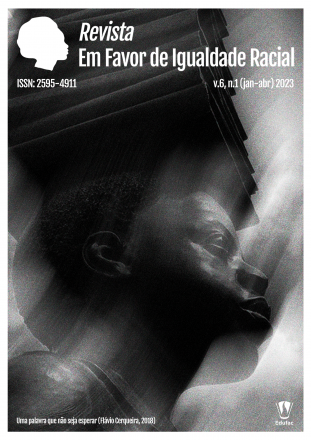LITERATURA E LIBERTAÇÃO: O ENSINO DE HISTÓRIA AFRO-BRASILEIRA NO PIBID-HISTÓRIA UFAC
Revista Em Favor de Igualdade Racial
LITERATURA E LIBERTAÇÃO: O ENSINO DE HISTÓRIA AFRO-BRASILEIRA NO PIBID-HISTÓRIA UFAC
Autor Correspondente: J. S. França | [email protected]
Palavras-chave: literatura infanto-juvenil, libertação, aula inovadora, pibid
Resumos Cadastrados
Resumo Português:
Apoiado na lei 10.639/2003, que estabelece a obrigatoriedade do ensino de História e cultura afro-brasileira e africana na Educação Básica, este trabalho é resultado da experiência vivenciada durante o ano de 2017 no Programa Institucional de Bolsas de Iniciação à Docência (PIBID), do Curso de História da Universidade Federal do Acre, cujo objetivo era a atividade de “Ensino com Pesquisa” (2016), proposta no qual cada bolsista PIBID elaborou uma aula a partir de linhas de pesquisas indicadas no Projeto Pibid/História (2014/2017). Nessa perspectiva, coube aos bolsistas procurar integrar os alunos da Educação Básica nas aulas, a fim de que, os discentes dos sextos anos pudessem participar como sujeitos ativos do processo de ensino e aprendizagem. As aulas foram ministradas na Escola Estadual Raimundo Gomes de Oliveira, situada no Conjunto Tucumã II, tendo como temática “Literatura como forma de libertação no período escravagista”. A base teórica deste trabalho consolidou-se nos pressupostos teóricos de Munanga (2007); Gomes (2002); Fernandes (2017); Salum (2005) e o artigo “Literatura, identidade e resistência: literatura afro-brasileira e africana em sala de aula” de Kleyton Ricardo Wanderley Pereira (2014). O ensino-pesquisa, enquanto método, orientou as leituras e análise de textos, com ênfase ao período escravagista, relacionados ao tema realizado nos encontros, tendo a participação e discussão de como o negro era representado na literatura. Assim, resultados alcançados: 1) desconstruir estereótipos socialmente constituídos; 2) fortalecer entre os negros a consciência de empoderamento social e, 3) despertar entre os “brancos” a consciência negra, compreendendo-a pela importância da literatura temática. Portanto, o vínculo Pibid-História e ensino de História serviram como estruturas acadêmicas dos efetivos diálogos realizados com o grupo de alunos da escola, visando o enfrentamento ao preconceito social e ao racismo institucional a partir do conteúdo da História e cultura africana, do Referencial Curricular da See. (2010).
Resumo Inglês:
Based on law 10.639/2003, which establishes the mandatory teaching of Afro-Brazilian and African history and culture in basic education, this work is the result of the experience lived during the year 2017 in the Institutional Program of Teaching Initiation Scholarships (PIBID) of the History Course of the Federal University of Acre. Whose objective was the activity of "Teaching with Research" (2016), a proposal in which each PIBID fellow prepared a class based on lines of research indicated in the Pibid/history Project (2014/2017). In this perspective, it was up to the scholarship holders to try to integrate the students of basic education in the classes, so that the students of the sixth year could participate as active subjects of the teaching and learning process. Classes were developed at the Raimundo Gomes de Oliveira State School, located in Conjunto Tucumã II, having as a theme "Literature as a form of freedom in the slave period". The theoretical basis of this work was consolidated in the assumptions of Munanga's thought (2007); Gomes (2002); Fernandes (2017); Salum (2005) and the article "Literature, identity and resistance: Afro-Brazilian and African literature in the classroom" by Kleyton Ricardo Wanderley Pereira (2014). The teaching-research, as a method, guided the readings and analysis of texts, with emphasis on the slave period, related to the theme performed in the meetings, with the participation and discussion of how black was represented in the literature. Thus, results achieved: 1) deconstruct socially constituted stereotypes; 2) to strengthen among blacks the awareness of social empowerment and, 3) to awaken among the "whites" the black consciousness, understanding the importance of thematic literature. Therefore, the Pibid-History bond and history teaching served as academic structures of the effective dialogues held with the group of students of the school aiming to confront social prejudice and institutional racism from the content of African History and Culture of the “State Secretary of Education” of Acre (SEE/AC) curriculum framework (2010).

